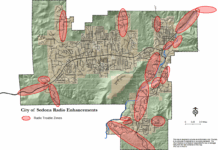
The Sedona City Council received a sales and bed tax update from Finance Director Cherie White during its Nov. 28 meeting, which indicated that tax receipts for the first three months of the fiscal year are up slightly compared to receipts from the first three months of last year.
White also continued to refuse to provide the council with the breakdown of STR tax revenues its members have requested.
Taxes
Sales tax revenues for the fiscal year to date were $2,248,015 in July, $2,088,510 in August and $2,775,780 in September for a total of $7,112,305, an increase of $273,175, or 4%, over last year.
For the year so far, the construction and amusement sectors are down slightly compared to FY 23, with no effective change in retail receipts. Restaurant and bar receipts have risen 8%, while hotel and communications and utilities receipts have risen 9%.
Bed tax revenues for the fiscal year to date were $522,779 in July, $492,948 in August and $768,445 in September for a total of $1,784,171, an increase of $186,301, or 9%, over last year.
By White’s calculations, the city is $426,209 ahead of last year’s revenues to date.
Hotel occupancy has risen to 60% for the year to date, up from 58% for FY 23. The month of September saw occupancy rise to 66% from 54% in August. The average daily room rate in September was between $325 and $350, nearly identical to the September rates for calendar years 2022 and 2021. For the fiscal year to date, the average room rate has declined for the second year to $270, which is well above its FY 21 level of $230.
“At this point a lot of the economists aren’t really thinking there’s going to be a recession anytime soon,” White said. “You never know.” She called September ’s receipts “a positive indicator of numbers not going down but heading up.” As for declining ADR, “maybe the hotels felt like they priced themselves out of the market a little bit and are trying to bring their prices back down,” White said.
“These numbers look optimistic,” Councilwoman Kathy Kinsella said. “Is that a fair statement?”
“Yes,” White answered.
“We keep hearing anecdotes of businesses that claim sales are down, that claim rooms are going unfilled,” Kinsella continued. “I have a hard time reconciling the anecdotes with these numbers. This is data showing collections that are made. Am I not seeing something?”
“Individual businesses may have different experiences,” White said. “Maybe they’re experiencing more impacts on the inflation. I’ve heard of some of the hotels talking about certain very specific things like housekeeping.”
“It appears the state of our economy is reasonably healthy, that one should be able to draw that conclusion,” Councilman Brian Fultz commented.
Does Airbnb Pay Taxes?
Earlier in the meeting, the council was also scheduled to approve a new intergovernmental agreement on revenue sharing with the Arizona Department of Revenue as a consent item until Councilman Pete Furman pulled the item for discussion.
“I read with great interest the IGA that we have with the Department of Revenue,” Furman said. “Appendix A does have the confidentiality requirements listed in there. It just struck me as I was reading that that it really focused on protecting taxpayers. The disclosure rules were to protect individual taxpayers and as I dug in a little bit more, and I looked at [Arizona Revised Statute] §42-5001, the tax person is, in the definition, the person liable for any tax imposed. And then I also rooted around and found an ADOR document on short-term lodging advice, and in there it says that the landlord is ultimately liable for finding and paying the taxes owed. And then there’s another pamphlet from ADOR online marketplace that actually talks about the online marketplace, folks like Airbnb, as the tax remitter.
“So it just occurred to me that the language in the documents talks about the taxpayer. Who’s the taxpayer in a short-term rental? Is it the landowner, the property owner of the short-term rental, or is it the online marketplace?
“I would like to see if we could get some council consensus to direct [City Attorney] Kurt [Christianson] perhaps to pursue that line of argument as to whether ADOR’s confidentiality requirements are to protect the taxpayers and who the taxpayers are … whether we could use that as leverage, perhaps, to get the data that we’ve all been interested in seeing from ADOR.”
“ADOR’s position is already that the online marketplace is considered our taxpayers,” Christianson said. “The definition of taxpayer is pretty broad.”
Mayor Scott Jablow asked White for her opinion.
“I can neither confirm nor deny whether or not Airbnb is a taxpayer,” White said, and declined to comment further.
Airbnb’s 2022 Form 10-K filed with the Securities and Exchange Commission shows that during that year, the company budgeted $96 million for income tax payments alone.
Councilwoman Jessica Williamson asked Christianson whether such an inquiry would be a worthwhile use of his time.
“There’s room for further research there and maybe a conversation with ADOR,” Christianson said.
“Other communities have released the data, and they have not, as far as we know, had to defend themselves from illegal challenges,” Vice Mayor Holli Ploog pointed out. “Correct?”
“That appears correct,” Christianson said. “Although the other communities do express they have more than 10 taxpayers in the short-term rental category. Major taxpayers.”
According to the Sedona Chamber of Commerce Hometown Guide, there are 68 traditional lodging facilities in Sedona. There are also at least 33 online lodging marketplaces, all of which — 111 total — pay sales tax in the hotel category.
When asked to clarify what legal argument he is using to advise the council that the proportion of STR tax data cannot be disclosed even though Sedona meets both of ADOR’s requirements — more than 10 taxpayers in the category, none of which are paying more than 90% of the taxes in that category — to allow the data to be disclosed, Christianson replied that he would not be able to look into the issue until after the new year.
In addition, ADOR’s confidentiality requirements as stated in the IGA also provide that a “city/town may disclose its aggregated financial information from less than ten [10] taxpayers provided city/ town first determines the aggregated data could not potentially reveal the financial information of an individual taxpayer.”
“I think it’s worth pursuing some greater insight on the question,” Fultz said, and the council unanimously approved having Christianson make further inquiries of ADOR.





















